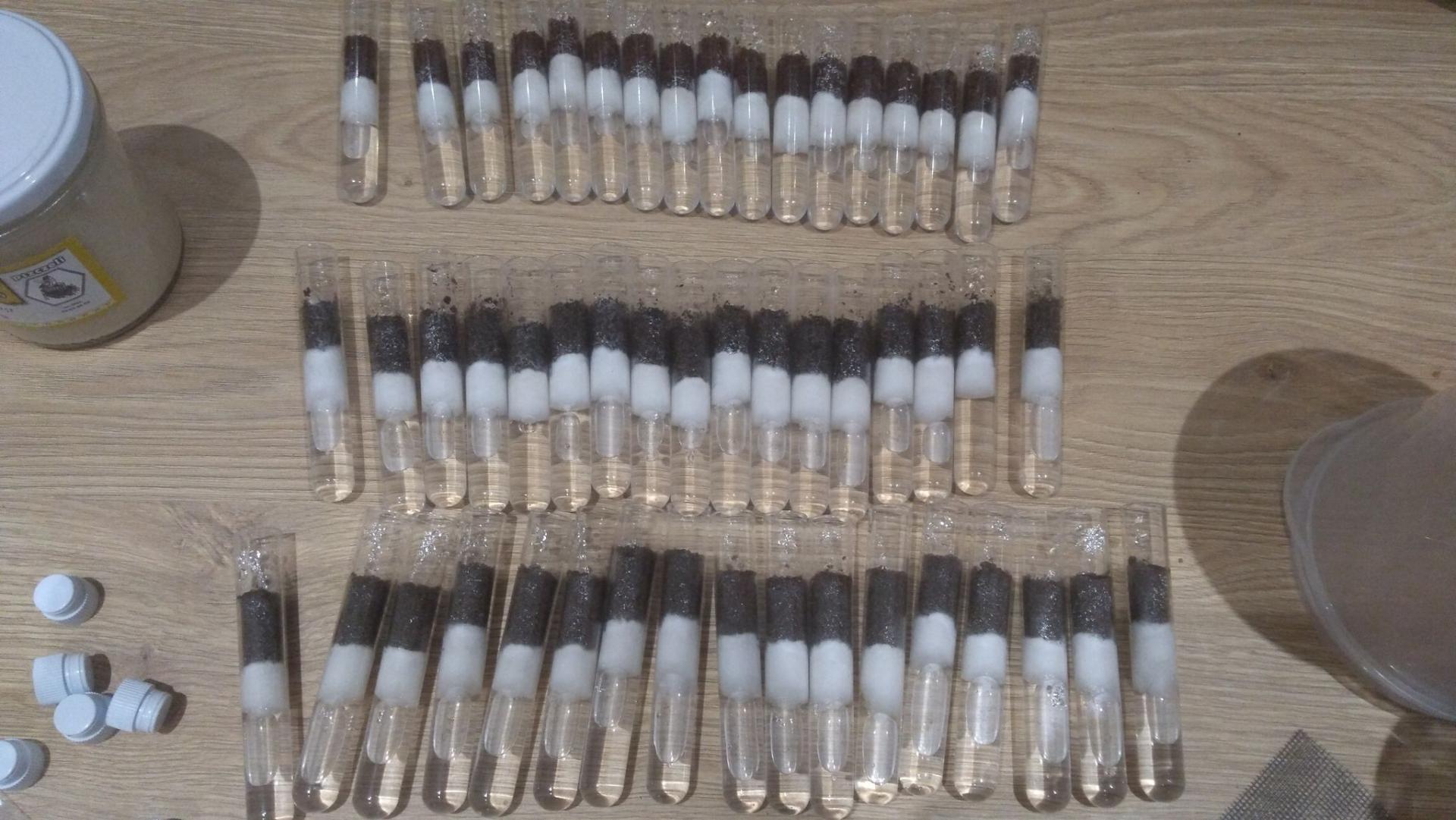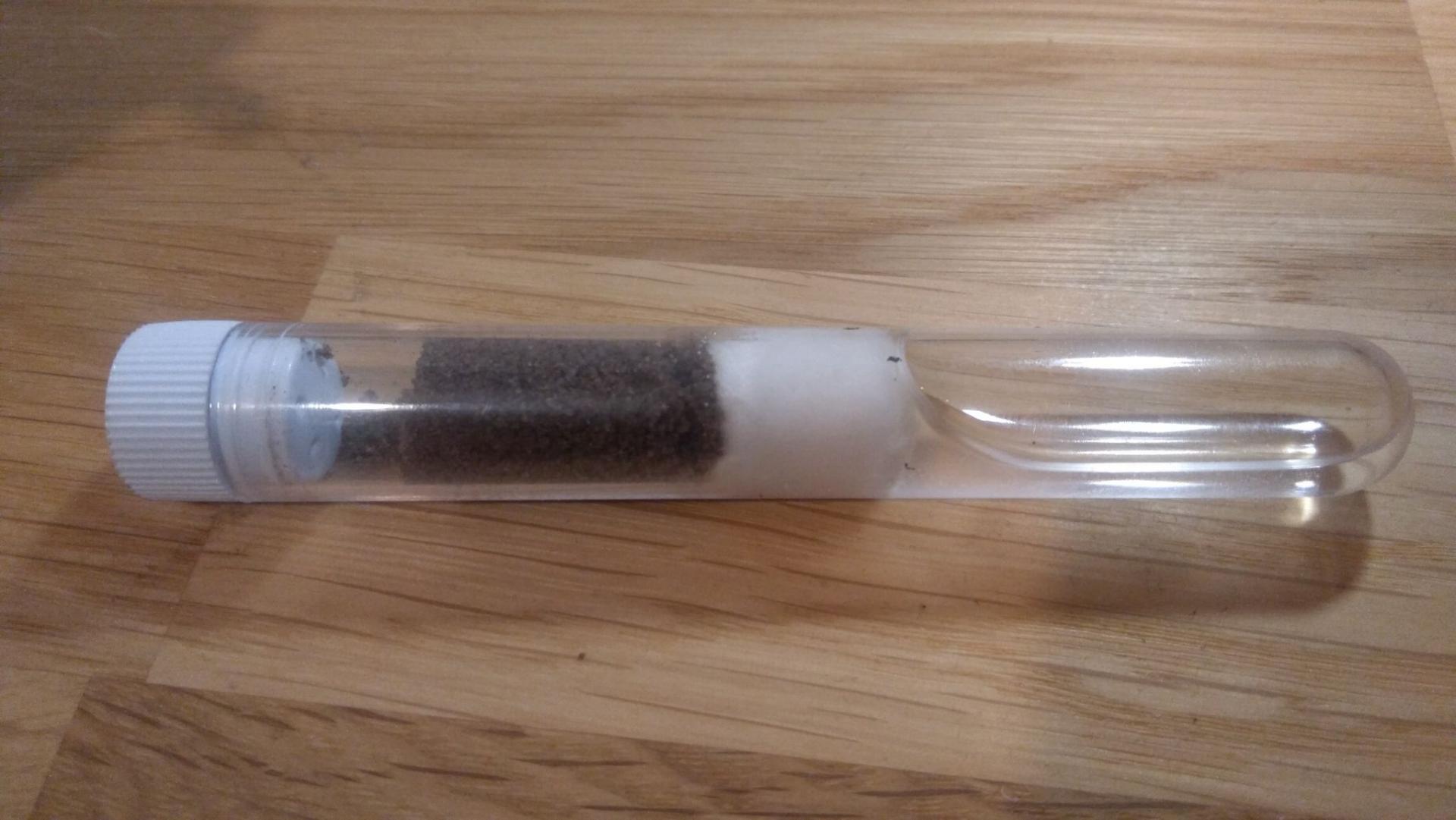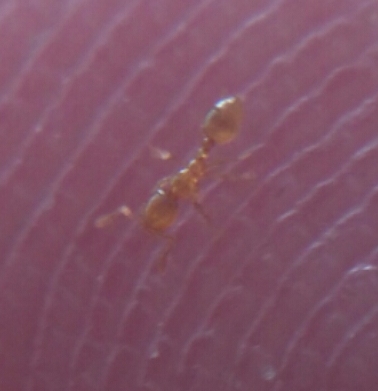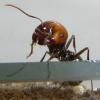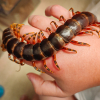Back in 2020 I have found an excellent spot for catching Solenopsis fugax*. These ants are notorious for dying for no reason and I had a lot of the queens die soon after catching..i packed them all in typical test tube setups and left them alone for some time. After few weeks I decided to separate the ones which laid some eggs before winter (all died later) and those which didn't, which I decided to overwinter. At that moment I had, if I recall correctly, 87 queens which entered the fridge.
On 2020.12.22 I took them out. 60 queens survived. At that moment I decided to run an experiment on these queens - what if a standard test tube is not a good founding setup for them? What if I added 2-3 cm of substrate into the standard tube, so it still has the water reservoir like a normal tube, but at the same time the queen can create her claustral chamber of natural (tiny) size and have constantly moist soil around her?
I decided to test 3 options of substrates and regular tubes as a control. The groups are unequal mostly because I acted before thinking.
17 tubes were filled with a mixture of sand and clay in 3:1 proportion. It's a rather good substitute for typical Polish soil - very sandy, but I added more clay than there is in the wild so it wouldn't collapse.
17 tubes were filled with coco peat. It is extremely popular in here. It is not a substitute of soil, but is meant to be something holding and seeping moisture well, creating high humidity all around the claustral cell.
17 tubes were filled with 1:1 mix of above. The idea is that pure soil does not exist at shallow depths as there are always some grass roots holding it together. I have no idea how deep do wild queens dig. The coco fiber I had had lots of fibers which could emulate roots.
9 tubes were just standard test tubes with water and cotton.
The tubes were 16x100 mm. I used plastic plugs with small holes in them so the tubes diidn't lose humidity as quickly as with cotton plug. This wouldn't be needed if I used longer test tubes. I placed the tubes vertically, so the down direction led to the cotton - to help the queens dig a hole in a natural direction. As the queens were far past their nuptial flight period many of them did not show the instinct to dig initially, I had to make holes with a stick for them and in case of two queens I had to poke them into the holes for them to notice their existence. Once in a hole they got their instincts back.
Believe it or not, but in the photo below there is a claustral chamber. They all built them close to cotton and side of the tube, probably because it was mechanically superior solution as they felt the tube is not going to collapse. Still observing what was happening inside required 20x magnifying glass and good light, no chance of taking photos in there.
The experiment started on 2021.01.01 and was concluded on 2021.06.21. That's when the last workerless queen died.
- 6 out of 17 (35,3%) queens in soil,
- 4 out of 17 (23,6%) queens in coco fiber,
- 6 out of 17 (35,3%) queens in mixture of both,
- 2 out of 9 (22,2%) queens in regular test tubes
have managed to raise colonies. Results suggest that use of soil helps the queens to found compared to regular test tubes. It also suggests that coco fiber is not a good substitute of soil as it did not increase the success rate. I suspect the coco fiber did not let enough air through - it was constantly wet around the claustral chambers. I suspect the mixture of soil and coco fiber resulted in soillike result because it allowed some air through just like soil did while still maintaining excellent mechanical properties, allowing the ants to form comfortably small claustral chambers.
Only one of the queens (in a soil tube) died after reaching workers stage and was counted as a failure. Many have died while having advanced brood pile, though, so laying eggs or having larvae is not a sign of success yet.
This gives an average of 6/18 (30%) success rate of queens which were already taken from a group which had lots of dead queens removed before starting the math! These ants drop like mosquitos after meeting a flamethrower. None of them died later up to point of me selling the colonies (which took a while), so never buy a lone queen of Solenopsis fugax! Either catch her yourself and hope for the best or buy an established colony.
What would I do differently if I was to do this experiment one more time?
- Definitely start it just after catching the ants. I didn't do that only because I believed I could sell them in bulk quickly and not have to deal with their founding.
- Use larger sample size and test only soil vs plain tube next time.
- The tubes would be glass, plastic ones got scratched easily which limited the already bad insight inside the claustral chambers.
Few comments on the species itself:
- These ants are stubborn. Moving them out of the test tubes used for experiments required gently removing soil with the colony from inside the tube into an outworld attached to new tube/nest. Then I picked the queen and some brood and placed her in the new tube using soft tweezers. Workers would realise where the nest is and organise the transport of rest of the colony to the queen.
- I did not use soil in tubes with established colonies. Only the smallest colony struggled in such setup, generally once there are few dozens of workers the colony is far less fragile and no longer needs special care.
- They are able to hunt down dust mites. I have seen it with my own eyes only once, but I have to admit - the hygiene in soil filled tube was below standard once the colonies started getting larger and tubes ran dry, which required me to add water from the front side. In normal circumstances this would have been overran by mites quickly, but Solenopsis fugax managed this issue by themselves.
- The species is supposedly almost dimorphic, but I have seen only one major worker in all the colonies. Maybe it's a matter of colony size (and that one just being produced prematurely), maybe enviromental stress or lack of thereof is needed for larger workers production. I don't know, just don't expect them to be dimorphic. They might not show any polymorphism.
- They can successfully sting me. I got some on my thighs during a clean&feed operation I did sitting in just underwear. Their stings irritated my skin for a good week. I did not feel the moment of stinging, just the long lasting itch.
- They are tiny, barely visible with naked eye. If you drop a worker on the floor - forget about finding it. Here's a photo of a worker on my papilary lines. They will find every hole and escape through it. They are known to be able to invade other colonies, so better think twice about your setup before they get large enough to start searching.
I encourage everyone who catches thief ant queens to try out soil filled test tubes or run your own experiment on simple test tube setup vs soil filled test tube setup. I am also curious whether the American thief ants are also known to die so easily.
*It must be noted that Solenopsis fugax is currently a dumpster name and whole European Solenopsis genus needs a revision. I did not take any attempts to ID these ants further than saying "they look like Solenopsis and officialy we have only S. fugax around here".
https://www.research...tera_Formicidae
Edited by Kowal, July 18 2023 - 3:15 PM.




